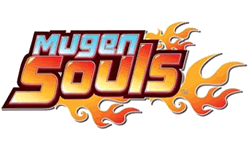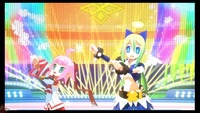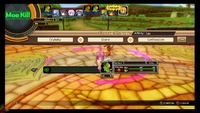|
|
 |
PLATFORM
|
PS3
|
BATTLE
SYSTEM
|

|
INTERACTION
|

|
ORIGINALITY
|

|
STORY
|

|
MUSIC
& SOUND
|

|
VISUALS
|

|
CHALLENGE
|
Unbalanced
|
COMPLETION TIME
|
40-60 Hours
|
|
OVERALL

|
+
The story occasionally
provides some laughs
-
Combat is boring and tedious
-
Convoluted mechanics
-
Extensive grinding required
-
Constant loading times
-
Too much moé
|
Click
here for scoring
definitions
|
|
|
Mugen Souls
is the latest title from developer Idea Factory,
published in the US by NIS America. Taking many
ideas and themes from NIS's own Disgaea
franchise, Mugen Souls provides an RPG
adventure that starts off quite promising despite
an over-abundance of moé. Sadly it
quickly devolves into an adventure in overly long
dialog, endless grinding, boring objectives, and
tedious battles filled with complicated mechanics
that neither add much to the experience nor help
the player win. Even good voice work and a
translation that brings decent humor to the table
at times can not save this game.
The story starts with the
self-declared undisputed Goddess Chou-Chou
proclaiming her intentions to conquer the universe
by making the seven worlds her peons. Together
with her first companions, Altis and Ryuto, the
story jumps right into the conquest of these
worlds and slowly leads to revelations about
Chou-Chou's past. Each planet features a similar
story to the next, involving tracking down the
hero and demon lord of each planet. At first this
proves to be a good opportunity to make fun of
video game clichés and pull off Disgaea
styled "evil but not really evil" characters. The
story then quickly devolves into typical game and
anime clichés that grow tiresome just a few
hours into the game. Most of the characters are
highly one-dimensional as well, repeating phrases
and actions matching their character archetype
over and over throughout the course of the game.
While this is common in many games of this style,
it's taken to an annoying extreme here. By the
time actual story revelations begin to take place,
they have little impact because the player will
simply have no emotional attachment to the
characters.
The story tries and at times
succeeds at being funny, partially thanks to the
efforts of NIS America's translators. A large part
of the craziness involved in the game's story
revolves around moé and vague
sexual themes that are never handled with any kind
of maturity. There's nothing highly offensive here
given that content has been removed for the
domestic release, but what's left over is hardly
much better. Instead, the images and jokes come
off as a failed attempt to distract the player
from gameplay failures.
Despite Mugen Souls
throwing a large number of complicated systems at
the player, gameplay is relatively simple. The
player will be tasked with exploring areas on each
planet, traveling to event points marked on the
map that continue the story, fighting enemies, and
finding occasional treasure. The areas look
colorful enough but the problem is there's nothing
really to explore. There are no optional dungeons
or towns, so there's little point to exploring
beyond finding the odd treasure chest or two.
Enemies are seen on screen and, as has become
typical in many JRPGs, the player can press a
button to swing at an enemy to begin combat and
get the first attack, while getting hit by the
enemy first does the opposite.
 Do
the moé dance! Do
the moé dance!
|
|
Combat is where the
previously mentioned complicated systems come into
play. Using a party of up to four characters, the
player can move each one a certain amount and
launch attacks on their turn, giving battles a
more tactical feel than the typical JRPG. In
addition to standard skills based on a typical MP
system, the party shares a pool of points that
increases from various actions such as killing
enemies, which can be used for super skills.
Characters can also use skills to launch enemies
into each other and around the battlefield for
extra damage. Chou-Chou has a special skill in
combat called moé kill. She can
turn into various character archtypes such as
"sadist" and "terse" to match the tastes of the
monsters, and then choose from a selection of
words to try and match them to the monster's
current mood. If successful, it will increase a
meter towards turning them into a peon. If
unsuccessful, it increases another meter that
raises the power of the monster. It's an
interesting idea that ultimately proves to be
tedious, confusing, and a complete and utter waste
of time.
Turning monsters into peons
increases the power of Chou-Chou's spaceship. The
infrequent spaceship battles are simple
rock-paper-scissor type affairs where the player
can choose between various kinds of attacks and
defenses. With the vast majority of these being
utter cake walks until the final few story
battles, there ends up being little to no
incentive to even waste time turning monsters into
peons. Even with an under-leveled ship late in the
game, the story ship battles can be overcome by
abusing a few powerful skills. Players will be
left scratching their heads over why so much time
is spent going over the system when it ultimately
adds nothing to the game.
Confusing design decisions
continue in the way the player advances through
each planet. The player unlocks new continents to
explore by moé-killing the current
continent, which involves capturing various points
on the map. There are three methods: either paying
in gold, having a certain overall kill count, or
utilizing a moé kill point. The moé
kill points are the same as in battle, except the
player must guess from a hint which of Chou-Chou's
forms the points are attuned to. The gold points
simply give the name of an item in the game's
store, which the player then has to give gold
equal to or greater than the cost of the item. The
first two aren't so bad, but the battle points
prove to be incredibly tedious. The balance of the
game's battle system is way off. Regular battles
for the vast majority of the game are incredibly
easy and quickly become annoying. This means
players will start skipping battles and then find
they have to grind through a bunch of them to
capture these points.
 Bees
enjoy the egotistical moé. Bees
enjoy the egotistical moé.
|
|
For those in need of
easy battles and other events, there is the Mugen
Field. While similar to Disgaea's
random dungeons, it unfortunately doesn't provide
nearly the same level of entertainment. It is a
simple string of battles intended to help the
player gain new skills, level up old skills, or
add defense item slots among other things. These
add little to the game, as leveling skills mainly
increases their MP cost for little gain, and new
skills take forever to acquire. It mostly serves
as a place to grind for levels, and with the
game's massive endgame difficulty spike the player
will be spending a lot of time there.
In addition to the
story characters available to level, the game
allows the player to create characters. Sadly, the
level of commitment required to make these
characters battleworthy is so high that they
aren't really worth the effort. At the end of the
day, the game's convoluted mechanics just don't
hold up to the massive number of battles that are
thrown at the player, and the huge difficulty
spike later in the game does not help.
The graphics and sound don't
help matters much either. The game has a colorful
anime look to it that is fine, with animated
portraits during conversations like those that
have appeared in recent Idea Factory games. In
engine graphics are all cell shaded 3D that don't
look quite as good as the 2D images. They aren't
horrible, just mostly unremarkable with a mix of
mediocre and decent attack animations in combat.
The real problem with the graphics comes in the
form of awful loading times. Loading between areas
is lengthy on its own, but battles suffer from
constant load times between nearly every action.
The game stalls before enemies move, before
enemies attack, and even before player characters
attack. The game offers the option to turn off
animations, but this doesn't reduce loading at
all. Even with the optional data install, the
already tedious battles are still hampered with
constant loading. The lackluster sound effects
don't help matters much, as they are repeated for
many attacks and don't
add much impact to abilities. The music is a
forgettable soundtrack filled with Disgaea-esque
tunes, but none of the tunes could be called
awful.
All in all, Mugen Souls
turns out to be an incredibly frustrating game
with some good ideas that quickly get lost in the
grind. Despite making fun of clichés at
times, the story ends up being an overly long
affair dragged down by the very clichés it
makes fun of. Tedious, boring, and insanely
frequent combat encounters are made all the worse
by required grinding and a giant spike in
difficulty after much of the game is a cake walk.
The frequent pandering elements of the game's
story and visuals can't hide its borderline broken
mechanics. Even the most ardent fan of JRPGs will
find little to like about this grindfest.
Review
Archives
|









